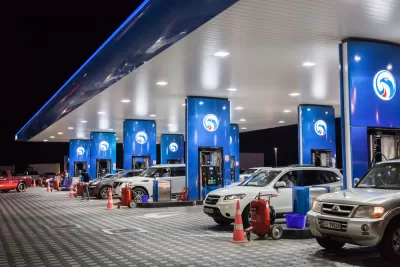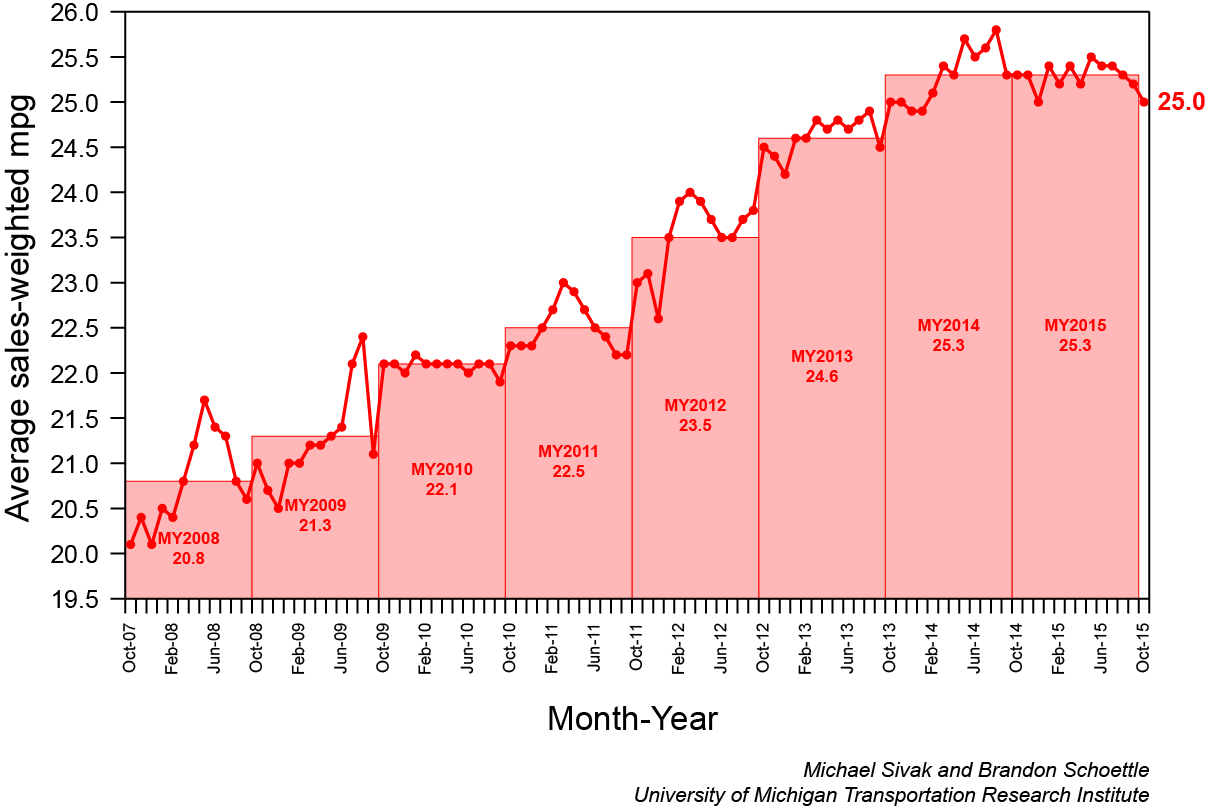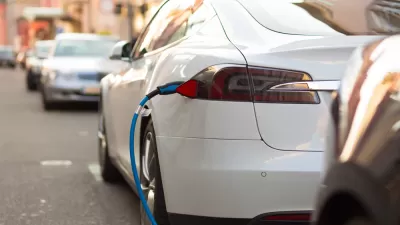New figures from the Federal Highway Administration show no abatement in increasing vehicle miles traveled (VMT). While low oil prices have been beneficial for the environment on the production end, it is wreaking havoc on the consumption side.

Low-priced oil played a major role in Royal Dutch Shell's decision in September to terminate Arctic oil exploration, their decision last month to end a huge oil sands development in Alberta, as well as being cited by President Obama on Friday as one reason to reject Transcanada Corp.'s application to build the 1,179-mile pipeline Keystone XL pipeline from Alberta to Nebraska:
"The pipeline would not lower gas prices for American consumers," stated the president. "The national average gas price is down about 77 cents over a year ago. It’s down a dollar over two years ago." [See related post].
However, low oil prices are producing opposing consequences on the consumption side by increasing demand for oil. Americans are driving more miles in less fuel-efficient vehicles and taking transit less often. AASHTO Journal reports on the latest federal mileage data, and they are cause to make OPEC cheer.
The Federal Highway Administration said its latest monthly "Traffic Volume Trends" report showed vehicle traffic on U.S. roadways reached 277.3 billion miles in August, a 2.3 percent gain from a year earlier and the most for any August on record.
That continues a trend of vehicles miles traveled growing on a year-over-year basis for 18 consecutive months and puts 2015 VMT on a pace to be the highest ever. The estimates include passenger vehicle, bus and truck travel.
While FHWA doesn't mention the correlation with low gas prices, Gas Buddy.com states it explicitly in their June 25 article: "A low fuel price environment clearly has jumpstarted new travel."
As for fuel efficiency, Dr. Michael Sivak, transportation researcher for University of Michigan Transportation Research Institute, has been reporting monthly on the fuel efficiency of vehicles purchased by consumers since 2007. Gas prices peaked in July 2014. The correlation is clear. From his Nov. 5 report:
The average fuel economy (window-sticker value) of new vehicles sold in the U.S. in October was 25.0 mpg—down 0.2mpg from September. This decline likely reflects the decreased price of gasoline in October, and the consequent increased sales of pickup trucks and SUVs. [Emphasis added].
Fuel economy is down 0.8 mpg from the peak reached in August 2014, but still up 4.9 mpg since October 2007 (the first month of our monitoring).
[Monthly updates found UMTRI Sustainable Worldwide Transportation]
The current oil market works against oil production that has high costs, but it is also increasing consumption. If "America is now a global leader when it comes to taking serious action to fight climate change," as President Obama proclaimed on Friday, he needs to recognize that notwithstanding increased fuel efficiency standards, low oil prices work against meeting his climate goals.
FULL STORY: FHWA Says Nation's Vehicle Mileage Continues Historic Climb for 18th Month

Planetizen Federal Action Tracker
A weekly monitor of how Trump’s orders and actions are impacting planners and planning in America.

Trump Administration Could Effectively End Housing Voucher Program
Federal officials are eyeing major cuts to the Section 8 program that helps millions of low-income households pay rent.

The 120 Year Old Tiny Home Villages That Sheltered San Francisco’s Earthquake Refugees
More than a century ago, San Francisco mobilized to house thousands of residents displaced by the 1906 earthquake. Could their strategy offer a model for the present?

Philadelphia Councilmember Proposes Transit Access Fund
The plan would allocate 0.5 percent of the general fund toward mobility subsidies for low-income households.

Texas Bill Would Ban Road Diets, Congestion Pricing
A Texas state senator wants to prevent any discussion of congestion pricing and could suspend existing bike lane and sidewalk projects.

USDOT Threatens to Pull New York Highway Funding
The Trump administration wants the state to kill New York City’s congestion pricing program despite its demonstrated success.
Urban Design for Planners 1: Software Tools
This six-course series explores essential urban design concepts using open source software and equips planners with the tools they need to participate fully in the urban design process.
Planning for Universal Design
Learn the tools for implementing Universal Design in planning regulations.
Ada County Highway District
Clanton & Associates, Inc.
Jessamine County Fiscal Court
Institute for Housing and Urban Development Studies (IHS)
City of Grandview
Harvard GSD Executive Education
Toledo-Lucas County Plan Commissions
Salt Lake City
NYU Wagner Graduate School of Public Service




























